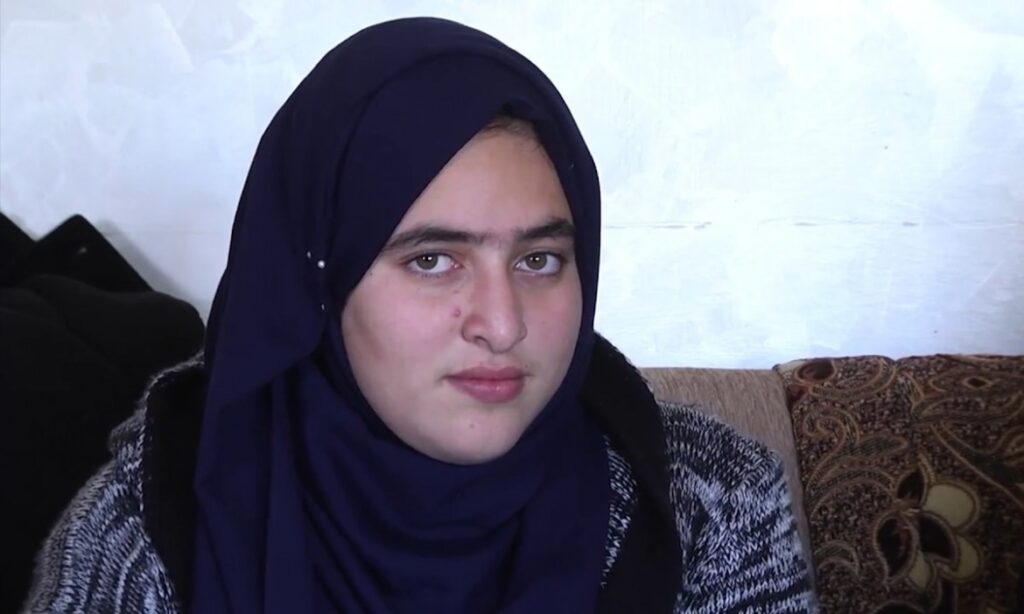
Sabah Faraoun, Palestinian Jerusalemite seamstress and mother who is held without charge or trial under administrative detention, was issued a final order for three months in administrative detention on 19 September 2017. She has been repeatedly ordered to different periods in administrative detention since she was seized by Israeli occupation forces on 19 June 2016.
Her administrative detention order has been renewed six times for periods ranging from one to four months; administrative detention orders are generally indefinitely renewable and Palestinians have been jailed for years at a time without charge or trial. She is one of five Palestinian women held in administrative detention, among over 450 total administrative detainees and 6,200 Palestinian political prisoners. This final order means that her administrative detention will not be renewed upon its expiration.
The other four Palestinian women held in administrative detention are former prisoner Ihsan Dababseh, Afnan Abu Haniyeh, Palestinian leftist parliamentarian and national leader Khalida Jarrar and Union of Palestinian Women’s Committees president Khitam Saafin.

Also on Tuesday, 19 September, an Israeli military court sentenced Ahlam al-Mahlouk, 19, from the village of Qarawat Bani Zeid near Ramallah, to six months and one day in prison for “incitement,” for posting on social media. She was seized by Israeli occupation forces who invaded her home on 16 June 2017 as she was in the midst of planning for her upcoming wedding.
A hearing was also held in the case of Rawan Dabbas, 22, from the village of Jaffna, near Ramallah, who has been imprisoned since 24 July during a pre-dawn raid on her family home. The case of Istabraq Yahya Tamimi, the Palestinian student at Bir Zeit University who was seized from the girls’ dormitory in a military raid on 20 March 2017, was continued until 31 October 2017 after convening Tuesday. She was to graduate in the summer, but has been forced to delay her studies due to her continued imprisonment by the Israeli occupation.

Meanwhile, on Sunday, 17 September, two Jerusalemite women known for their involvement in the defense of Al-Aqsa Mosque against Israeli settlers and occupation forces, Khadija Khweis and Hanadi Halawani, both had their detention extended an additional week until Sunday, 24 September. Both Khweis and Halawani have been banned from the holy site by occupation forces in the past but are dedicated to continuing their activities at the mosque, under threat from Israeli forces who seek to take it over.
There are currently 58 Palestinian women prisoners in Israeli jails, including 10 minor girls under the age of 18. It should be noted that several more of the jailed women were under 18 when sentenced and have turned 18 behind Israeli bars, such as Nurhan Awad.
The 10 girls, all held in HaSharon prison among 35 Palestinian women (the remaining 23 women prisoners are held in Damon prison) are: Iman Ali, Marah Jaida, Lama al-Bakri, Israa Jaber, Amal Kabha, Manar Shweiki, Malak al-Ghaliz (the youngest prisoner at age 14), Huda Areenat, Malak Salman and Nour Zreikat.

Lama al-Bakri, 17, was sentenced on Tuesday to three years and two months in Israeli prison and a fine of 6,000 NIS ($1700 USD). Meanwhile, the mother of Amal Qabha, 17, from the village of Umm al-Rayhan near Jenin, serving a one and a half year sentence, had an interview with the Prisoners’ Information Office, in which she said that her daughter is beloved within the prison among her fellow Palestinian women prisoners for her creativity and artwork. Amal was accused of attempting to attack an occupation soldier at a checkpoint between her home village and the village of Tura; she is attempting to complete her 11th grade studies inside prison. Her mother emphasized that she is an excellent student who wants to take the Tawjihi exam and has always planned to attend university.
She denounced the conditions of the girls’ imprisonment in Israeli prisons including frequent trips on the “bosta,” which can often last for multiple days, when being transported back and forth to the military courts, noting that the military court convened 14 times in Amal’s case.
Discover more from Samidoun: Palestinian Prisoner Solidarity Network
Subscribe to get the latest posts sent to your email.




